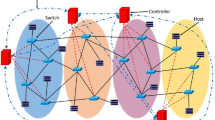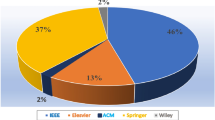Abstract
In delay/disruption tolerant networks (DTNs), content distribution is performed leveraging on the transient and dynamic contacts between moving users. Such a best effort mechanism is prone to unbounded downloading delays and bad user experience. To cope with these occurences, this paper introduces a novel mechanism to improve content distribution in DTNs. The proposed mechanism is based on the delay tolerant transport protocol and aims at controlling the diversity in the coded information transmission without increasing the use of network resources or including any feedback messages. In order to validate the proposed mechanism, different scenarios have been evaluated using known DTNs routing protocols. The results show significant gains achieved in terms of delivery ratio in all evaluated scenarios, confirming the efficiency and effectiveness of our protocol independently of the lower layer protocols in use.







Similar content being viewed by others
References
Albini, F. L. P., Munaretto, A., & Fonseca, M. (2011). Delay tolerant transport protocol—DTTP. In Global information infrastructure symposium (GIIS), pp. 1 – 6. doi:10.1109/GIIS.2011.6026709.
Albini, F. L. P., Munaretto, A., & Fonseca, M. (2011). PTTA—Protocolo de transporte tolerante a atrasos. In XXIX Simpsio Brasileiro de Telecomunicaes (SBrT2011).
Altman, E., & De Pellegrini, F. (2009). Forward correction and fountain codes in delay tolerant networks. In The 28th conference on computer communications (IEEE INFOCOM 2009), pp. 1899–1907. IEEE. doi:10.1109/INFCOM.2009.5062111.
Broch, J., Maltz, D. A., Johnson, D. B., Hu, Y. C., & Jetcheva, J. (1998). A performance comparison of multi-hop wireless ad hoc network routing protocols. In Proceedings of the 4th annual ACM/IEEE international conference on mobile computing and networking (MobiCom ’98), pp. 85–97. ACM, New York, NY, USA. doi:10.1145/288235.288256.
Burgess, J., Gallagher, B., Jensen, D., & Levine, B. N. (2006). Maxprop: Routing for vehicle-based disruption-tolerant networks. In Proceedings of the IEEE INFOCOM.
Cerf, V., Burleigh, S., Hooke, A., Torgerson, L., Durst, R., Scott, K., et al. (2007). RFC 4838, delay-tolerant networking architecture. IRTF DTN Research Group.
Chahin, W., De Pellegrini, F., El-Azouzi, R., & Azad, A. P. (2011). Blind online optimal forwarding in heterogeneous delay tolerant networks. In IFIP—Wireless days.
Dai, Y., Yang, P., Chen, G., & Wu, J. (2010). CFP: Integration of fountain codes and optimal probabilistic forwarding in DTNS. In GLOBECOM, pp. 1–5. IEEE.
Dvir, A., & Vasilakos, A. V. (2010). Backpressure-based routing protocol for DTNS. In S. Kalyanaraman, V. N. Padmanabhan, K. K. Ramakrishnan, R. Shorey & G. M. Voelker (Eds.), SIGCOMM, pp. 405–406. ACM. http://dblp.uni-trier.de/db/conf/sigcomm/sigcomm2010.html#DvirV10.
Fall, K. (2003). A delay-tolerant network architecture for challenged internets. In Proceedings of the 2003 conference on applications, technologies, architectures, and protocols for computer communications (SIGCOMM ’03), pp. 27–34. ACM, New York, NY, USA.
Jain, S., Demmer, M., Patra, R., & Fall, K. (2005). Sing redundancy to cope with failures in a delay tolerant network. SIGCOMM Computers Communication Review, 35, 109–120. doi:10.1145/1090191.1080106.
Johnson, D. B., & Maltz, D. A. (1986). Dynamic source routing in ad hoc wireless networks. In Mobile computing (pp. 153–181). Dordrecht: Kluwer.
Keränen, A., Ott, J., & Kärkkäinen, T. (2009). The ONE simulator for DTN protocol evaluation. In Proceedings of the 2nd international conference on simulation tools and techniques (SIMUTools ’09). ICST, New York, NY, USA.
Lindgren, A., Doria, A., & Schelén, O. (2003), Probabilistic routing in intermittently connected networks. SIGMOBILE Mobile Computing and Communications Review, 7, 19–20. doi:10.1145/961268.961272.
Mackay, D. J. C. (2005). Fountain codes. IEEE Proceedings on Communications, 152(6), 1062–1068. doi:10.1049/ip-com:20050237.
Oliveira, C. T. D., Taveira, D. M., Braga, R. B., & Duarte, O. C. M. B. (2008). Uma proposta de roteamento probabilstico para redes tolerantes a atrasos e desconexes. In XXVI Simpsio Brasileiro de Redes de Computadores e Sistemas Distribudos, pp. 735–748. SBRC.
Spyropoulos, T., Psounis, K., & Raghavendra, C. S. (2005). Spray and wait: An efficient routing scheme for intermittently connected mobile networks. In Proceedings of the ACM SIGCOMM workshop on delay-tolerant networking (WDTN ’05), pp. 252–259. ACM, New York, NY, USA. doi:10.1145/1080139.1080143.
Spyropoulos, T., Rais, R. N., Turletti, T., Obraczka, K., & Vasilakos, A. (2010). Routing for disruption tolerant networks: Taxonomy and design. Wireless Networks, 16(8), 2349–2370. doi:10.1007/s11276-010-0276-9.
Sun, X., Yu, Q., Wang, R., Zhang, Q., Wei, Z., Hu, J., et al. (2013). Performance of DTN protocols in space communications. Wireless Networks, 1–19. doi:10.1007/s11276-013-0582-0.
Vahdat, A., & Becker, D. (2000). Epidemic routing for partially connected ad hoc networks. Duke University: Technical Report CS-2000-06.
Vasilakos, A., Zhang, Y., & Spyropoulos, T. (2011). Delay tolerant networks: Protocols and applications. Wireless networks and mobile communications series. CRC Press. http://books.google.com.br/books?id=2ERN5lgs3AwC.
Wang, R., Burleigh, S., Parikh, P., Lin, C. J., & Sun, B. (2011). Licklider transmission protocol (LTP)-based DTN for cislunar communications. IEEE/ACM Transactions on Networking, 19(2), 359–368. doi:10.1109/TNET.2010.2060733.
Wang, R., Wei, Z., Dave, V., Ren, B., Zhang, Q., Hou, J., et al. (2011). Which DTN CLP is best for long-delay cislunar communications with channel-rate asymmetry? IEEE Wireless Communications, 18(6), 10–16. doi:10.1109/MWC.2011.6108327.
Wang, R., Wei, Z., Zhang, Q., & Hou, J. (2013). LTP aggregation of DTN bundles in space communications. IEEE Transactions on Aerospace and Electronic Systems, 49(3), 1677–1691. doi:10.1109/TAES.2013.6558012.
Wang, Y., Jain, S., Martonosi, M., & Fall, K. (2005). Erasure-coding based routing for opportunistic networks. In Proceedings of the ACM SIGCOMM workshop on delay-tolerant networking (WDTN ’05), pp. 229–236. ACM, New York, NY, USA. doi:10.1145/1080139.1080140.
Zeng, Y., Xiang, K., Li, D., & Vasilakos, A. V. (2013). Directional routing and scheduling for green vehicular delay tolerant networks. Wireless Networks, 19(2), 161–173 (2013). http://dblp.uni-trier.de/db/journals/winet/winet19.html#ZengXLV13.
Zhang, Q., Jin, Z., Zhang, Z., & Shu, Y. (2009). Network coding for applications in the delay tolerant network (DTN). In Proceedings of the fifth international conference on mobile ad-hoc and sensor networks (MSN ’09), pp. 376–380. IEEE Computer Society, Washington, DC, USA. doi:10.1109/MSN.2009.68.
Acknowledgments
This work was supported by the STIC-AmSud project “CUDEN—Collaborative Centric User-Device Networking” (12STIC-02) and by the authors’ individual grants from CNPq and scholarship (Process No. 9830/12-0) from CAPES Brazil. The work of F. De Pellegrini has been supported by the European Commission within the framework of the CONGAS project FP7-ICT-2011-8-317672.
Author information
Authors and Affiliations
Corresponding author
Rights and permissions
About this article
Cite this article
Albini, F., Munaretto, A., Fonseca, M. et al. A blind mechanism to improve content distribution in delay/disruption tolerant networks. Wireless Netw 20, 935–943 (2014). https://doi.org/10.1007/s11276-013-0651-4
Published:
Issue Date:
DOI: https://doi.org/10.1007/s11276-013-0651-4




